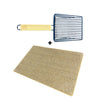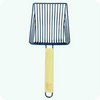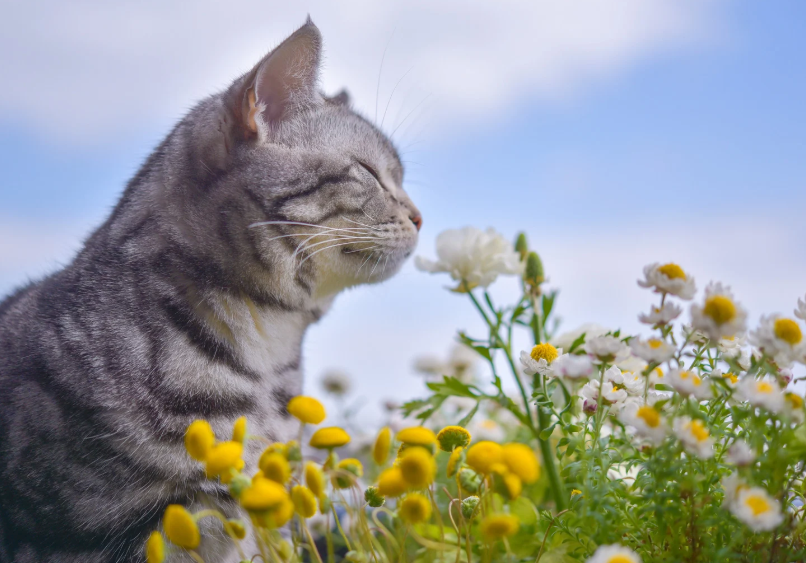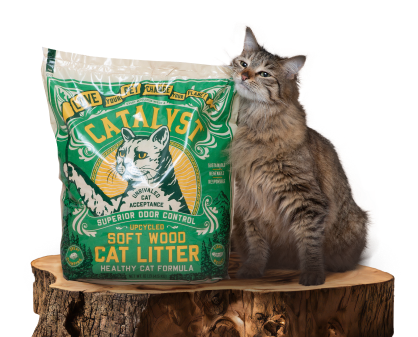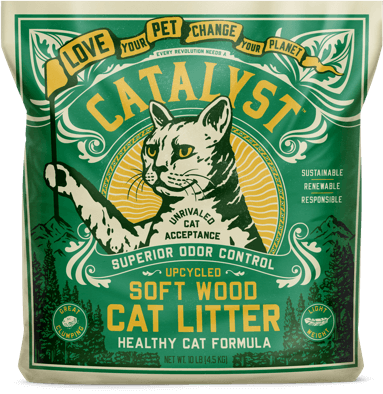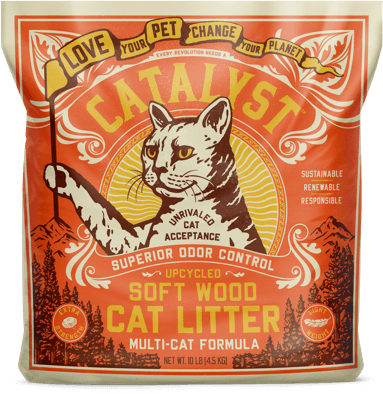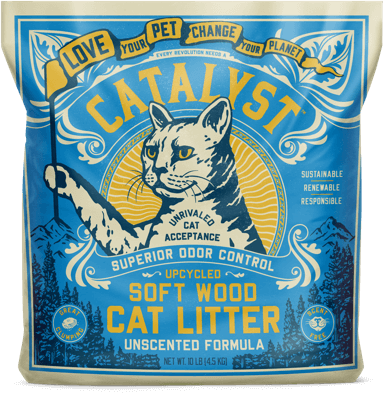Catalyst Pet believes health and sustainability should be practiced—and celebrated—every day of the year. In honor of a commitment to sustainability, we’re sharing the Ultimate Green Cat Guide, which includes all the ways pet owners can love on the planet and their pets.
Litter, Upcycled
Choose a litter that is sustainable and still performs so you and your cats will want to stick with it. Catalyst Pet has built its entire brand on completely sustainable, biodegradable, clumping litter made of upcycled soft pine wood and zero contaminants. Most products on the market are clay litters that contain the chemical compound silica, which, when inhaled, is considered a carcinogen. The more a feline kicks up the litter, the more of it gets circulated in the air, potentially causing respiratory problems for both cats and humans. Catalyst Pet litter doesn’t contain any silica, or other chemicals, and it’s 99% dust-free, leaving respiratory irritants behind.
Clay litters can also be harmful for cats due to the sodium bentonite, which is used as a clumping agent. When exposed to liquids, it can swell up to 15 times its natural size. This can be concerning when it gets on a cat’s fur and paws, and he licks it off. Ingesting too much can lead to irritation and even potential intestinal blockages. Kittens are particularly vulnerable to this because they may want to taste the litter out of childlike curiosity. Catalyst Pet is sodium bentonite free, instead using a natural clumping agent for easy, clean scooping.
And sodium bentonite isn’t only harmful for cats. How the mineral is strip-mined is damaging for the planet. A 2017 report reveals that more than five billion pounds of sodium bentonite is mined each year just for cat litter, with the vast majority ending up in landfills—more than 125,000 truckloads each year—since it’s not biodegradable. Catalyst Pet does not require precious resources for its manufacture. The upcycled soft wood fiber used to make it is collected from wood processing facilities that would otherwise be sent to a landfill.
Clean Poop Is Not an Oxymoron: Use Biodegradable Poop Bags
Even if poop bags are labeled green, chances are they’re still made from recycled plastics that (spoiler alert) never biodegrade. Available in two sizes to handle any job, Catalyst Biodegradable Waste Bags are made from bioplastics that come from corn and break down in just weeks. These bags do a great job protecting the environment while keeping your house clean. They’re also nice to the touch, matte instead of plastic-y, and they control odor perfectly.
Yup, Even Pet Products Can Be Green
The good news is there are more sustainable pet products on the market now than ever.
Check out our Catalyst Scoop with a deep shovel, wider frame and wide slats for easy sifting. The long handle provides the distance your hands need for a safe job. It’s made from lightweight, durable materials including bamboo and metal—no plastic!
Crafted to pair perfectly with Catalyst Pet’s soft wood litter, this 24" x 36" mat (roughly the size of a doorway rug or a large movie poster) is woven from tan sisal fibers. Sisal is a durable and biodegradable natural fiber derived from the Agave sisalana plant, known for its strength and resilience. Its natural texture provides a comfortable path for your feline, capturing stray litter bits while they tread, keeping your home cleaner. What's more? This durable mat is machine washable, ensuring prolonged freshness with minimal effort.
Adopt, Don’t Shop
Looking to add a cat or kitten to your family? Skip the breeder and adopt your next cat or kitten from a local shelter or rescue. Catalyst Pet believes sustainability is about more than the environment; it’s about health and justice in our communities. That’s why the company launched a shelter and rescue program in June 2020 to support organizations and people across the country that rescue, shelter, and trap-neuter-return kittens and cats.
Spay or Neuter Your Cat
Now more than ever, it’s important to work to minimize the population of outdoor cats, and one of the best ways to do that is to spay or neuter your kitty as soon as possible. Want to do more? Donate to local shelters and veterinarians who use the funds to do TNR programs to spay and neuter outdoor cats in your area.
Toying with Going Green
Look for more eco-friendly cat toys made from natural materials like wool, organic cotton, bamboo, recyclable cardboard or hemp. Don’t forget to check out your local secondhand marketplaces to see if you can find some pre-loved toys as opposed to non-recyclable materials that will eventually end up in landfills. It’s also fun and easy to make your own pet toys by reusing what you have around the house. Cats don’t need much to be entertained, cardboard boxes or some fabric scraps can offer plenty of excitement. You can also grow your own organic catnip to add to your DIY cat toys. These easy-to-grow kits are chemical-free and good for their tummy.
You Are What You Eat
Look to feed your feline pal food that is sustainably sourced. Cats are obligate carnivores, and, sadly, the meat industry uses valuable resources and can be quite destructive to our planet. Look for cat food that contains by-products instead, which is a way of making sure we’re using every part of the food instead of wasting it. Fish and chicken are also less intensive than beef and lamb-based foods. Even better, look for locally produced pet food.
Caring for your cat and caring for the planet don’t have to be separate goals. With a few thoughtful swaps and sustainable choices, you can reduce your environmental paw print while keeping your feline friend happy and healthy. From the litter box to the food bowl—and even playtime—every little effort adds up.
At Catalyst Pet, we believe sustainability isn’t a one-time gesture—it’s a daily practice rooted in love, responsibility, and a little bit of curiosity (just like our cats). So go ahead: scoop smarter, shop mindfully, and share what you’ve learned with fellow cat lovers. Together, we can build a cleaner, greener future—one purr at a time.
